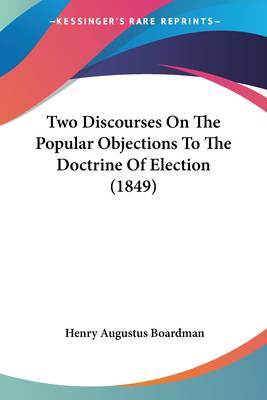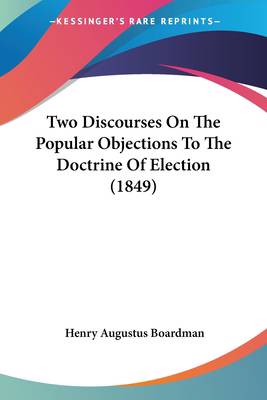
Door een staking bij bpost kan je online bestelling op dit moment iets langer onderweg zijn dan voorzien. Dringend iets nodig? Onze winkels ontvangen jou met open armen!
- Afhalen na 1 uur in een winkel met voorraad
- Gratis thuislevering in België vanaf € 30
- Ruim aanbod met 7 miljoen producten
Door een staking bij bpost kan je online bestelling op dit moment iets langer onderweg zijn dan voorzien. Dringend iets nodig? Onze winkels ontvangen jou met open armen!
- Afhalen na 1 uur in een winkel met voorraad
- Gratis thuislevering in België vanaf € 30
- Ruim aanbod met 7 miljoen producten
Zoeken
Two Discourses On The Popular Objections To The Doctrine Of Election (1849)
Henry Augustus Boardman
Paperback | Engels
€ 27,45
+ 54 punten
Uitvoering
Omschrijving
""Two Discourses on the Popular Objections to the Doctrine of Election"" is a book written by Henry Augustus Boardman and published in 1849. The book is a collection of two discourses that address the common objections raised against the Christian doctrine of election. The first discourse examines the objection that this doctrine is inconsistent with the justice and goodness of God. The author argues that God's sovereignty and mercy are not in conflict with each other, and that the doctrine of election is actually a manifestation of God's grace and love. The second discourse deals with the objection that this doctrine is fatalistic and undermines human responsibility. Boardman argues that the doctrine of election does not negate human agency, but rather affirms it, as it is through faith and obedience that individuals are chosen by God. The book is written in a clear and accessible style, and provides a thoughtful analysis of a complex theological topic.This scarce antiquarian book is a facsimile reprint of the old original and may contain some imperfections such as library marks and notations. Because we believe this work is culturally important, we have made it available as part of our commitment for protecting, preserving, and promoting the world's literature in affordable, high quality, modern editions, that are true to their original work.
Specificaties
Betrokkenen
- Auteur(s):
- Uitgeverij:
Inhoud
- Aantal bladzijden:
- 76
- Taal:
- Engels
Eigenschappen
- Productcode (EAN):
- 9781120949011
- Verschijningsdatum:
- 29/01/2010
- Uitvoering:
- Paperback
- Formaat:
- Trade paperback (VS)
- Afmetingen:
- 152 mm x 229 mm
- Gewicht:
- 113 g

Alleen bij Standaard Boekhandel
+ 54 punten op je klantenkaart van Standaard Boekhandel
Beoordelingen
We publiceren alleen reviews die voldoen aan de voorwaarden voor reviews. Bekijk onze voorwaarden voor reviews.











